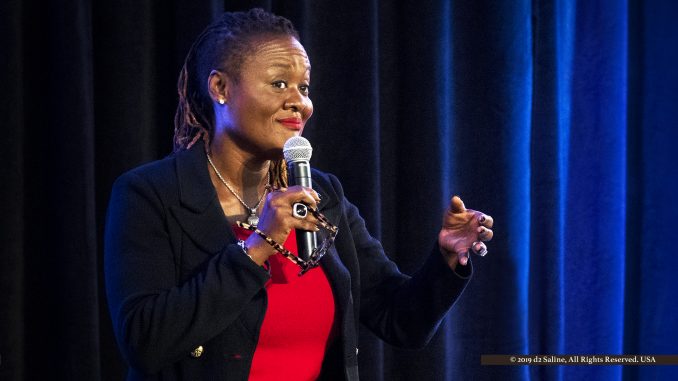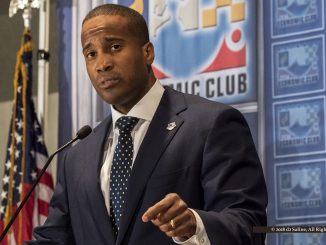
Where does one begin a talk on diversity before a local business leaders luncheon?
Featured speaker Marlin G Williams was presumably chosen by Washtenaw Economic Club leadership for her professional expertise, with requisite summary in promotional materials, then more generously endorsed when she was introduced yesterday by Washtenaw Community College President Dr Rose Bellanca. [2-4]
“Why is it important?” is a questions undoubtedly on the mind of some. Is it practical if even possible to gain a more appropriately thorough understanding of this matter within narrow constraints of commercial profit and loss assessments?
Ms Williams took to the podium with a cold open focused on an entirely different subject.
“I’ve got my next career move all mapped out,” she began.
I’ve gotta stay put until my daughter graduates from high school. Then I’m going to travel the world; I’m gonna drink Scotch and talk about it. I’ll be ‘The Scotchanista,’ the Scotchanista. I’m on YouTube: Google it. [6,7]
With that she pivoted to the topic at hand — in equal measure of passion for this subject matter, its studied fundamentals, and investment in making positive connection with her immediate audience here. For Marlin Williams, this meant challenging the too limited construction of “diversity.”
‘Diversity’ without ‘inclusion’ means nothing. We think ‘if we have diversity, we’re good.’ ‘Diversity’ is asking me to the dance. ‘Inclusion’ means asking me to dance when I arrive.
Inclusivity is often the piece that is missing from a gender and racial perspective. How do people feel when they show up — regardless of how they show up? How are they feeling when they have an idea?
She offered example of street light and bus timing. “Solutions” to these questions are based on understanding the problem, which differs based on perspective, life experiences. The engineer who drives his own car to work during regular business hours at a place that sets those schedules is not only more likely to have a view instructed by technical and energy consumption and maintenance considerations.
He is also less likely to see things from the perspective of someone who has limited access to transportation, for second- or third-shift hours, coming in from a domicile some greater distance away.
Would it even occur to you to include someone from outside of your public works department to contribute their perspective to this discussion?
“Too often, we get stuck on race or gender,” she then added. “Both are important, but they’re not all of it. You’re not looking for ‘so many of this group’ so you can ‘attract so many of that group’ through affinity.
Diversity and inclusion are their own ends because of the insights they provide you in understanding the customers you have and the customers you want to have.
Further, achieving this end requires broad strategic thinking, planning, and can’t happen where operational silos exist. “It’s not something you task to human resources and leave it to them to make it happen.
Everyone has to be at the table with this. And if you’re at that table, you have to be there to bring a perspective. But even that’s not enough. If you’re at the table but you don’t have the courage to speak up, you have to give up your seat to someone who will speak up.
That means diversity in thought, diversity in perspective, diversity in life experience. ‘All of one thing’ will never mean different outcomes. If you all have the same perspective, is it any wonder why you have no creativity or innovation? I’ve found that multicultural experiences at the table increase creativity, in my research.
Now, when you’re dealing with a diverse group, it’s going to be harder. The easier way is to like, to agree. But ‘tough’ is where the rewards are. Diversity creates dissent. But that’s good.
In summary, Ms Williams offered advice on getting started. “If you’re ready, say so. If not, say that.
It’s also important to remember that you’re going to make mistakes. You have to be willing to take yourself where you are.
At this point it was clear that Marlin Williams’ story about pursuing her unique passion as a woman interested in Scotch was more than icebreaker.
It could also be taken as metaphor in understanding the passionate commitment that is needed to affect changes necessary to thoroughly embrace an organizational culture of diversity and inclusion.
Go after this with the zest of a budding Scotchanista.
References
- Washtenaw Economic Club (home page).
- “Marlin Williams” LinkedIn.
- “Marlin Williams” Marketplace eSpeakers.
- “TechTown names Marlin Williams diversity and inclusion entreprenuer-in-residence” Kristin Palm (February 2, 2017) TechTown Detroit.
- “Importance of Diversity in the Growth of Your Business” Washtenaw Economic Club (October 28, 2019) Facebook Events.
- “Celebrate National Scotch Day with The Scotchanista” (July 27, 2018) WDIV 4 Click On Detroit.
- “Scotchanista” YouTube.



